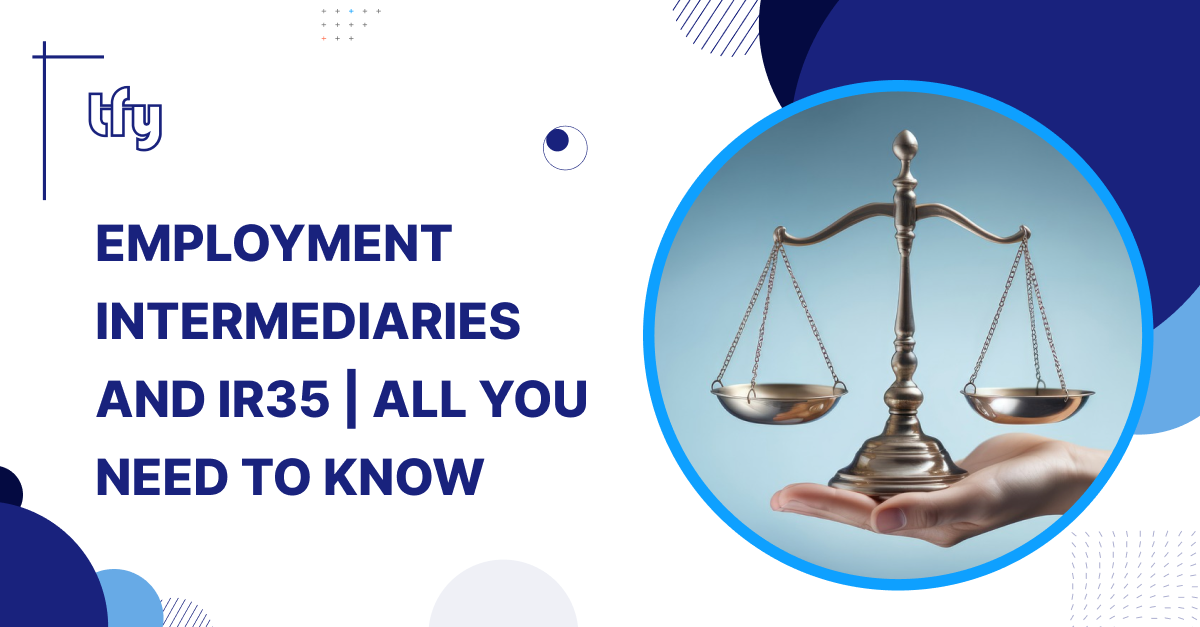
Navigating the contractor world can be tricky, especially when it comes to employment intermediaries and IR35. Both businesses and independent contractors need a clear understanding of how these entities function and how IR35 impacts their arrangements. So, let’s explore the different types of employment intermediaries, from PSCs and MSCs to umbrella companies and agencies, and delve into their roles in connecting workers with employers.
What are Employment Intermediaries?
Employment intermediaries are business entities that connect workers with third-party employers.
Hiring, screening, training, payroll, tax compliance, and dispute resolution are just a few of the services they can offer. These intermediaries act as a bridge between the contractor and the client, providing various services and administrative support throughout the employment process.
Employment intermediaries must follow certain rules and obligations regarding the tax and national insurance of the workers they supply. Their primary purpose is to ensure smooth and compliant arrangements between the parties involved.
Different Employment Intermediaries and Their Types
There are various kinds of employment intermediaries, depending on:
- the type and length of the work,
- the intermediary's level of involvement and accountability, and
- the worker's legal status.
Let’s take a look at the different employment intermediaries, one by one.
PSCs, or Personal Service Companies
Offering greater control and flexibility than traditional employment, personal service companies (PSCs) have become the preferred option for many contractors. Established by the contractors themselves, PSCs act as their agents, negotiating contracts and handling payments. This allows contractors to receive their earnings through the PSC, potentially reducing tax burdens and offering the option of dividend distributions.
While PSCs offer tax advantages, IR35 rules aim to curb those benefits by potentially reclassifying contractors as employees for tax purposes if their work closely resembles that of direct employees.
MSCs, or Managed Service Companies
While Managed Service Companies (MSCs) share similarities with Personal Service Companies (PSCs) as employment intermediaries, they go the extra mile. Think of them as PSCs with a built-in support system. They handle everything from legal counsel and invoicing to tax compliance and payroll administration, freeing contractors to focus on their work.
But unlike PSCs, MSCs follow stricter tax and National Insurance Contributions (NICs) rules. These regulations prevent potential tax loopholes and ensure that income received by the MSC on the contractor's behalf is taxed as if the contractor were directly employed.
Umbrella Business
Umbrella businesses offer a hassle-free solution for both contractors and companies seeking simplified payroll and tax management. They act as an intermediary, employing contractors under their own umbrella and taking over all the administrative burden. This means contractors don't have to worry about paperwork like payments, taxes, or national insurance contributions – the umbrella business handles it all.
Working through an umbrella company grants contractors the benefits of employee status, including legal rights and potential access to company benefits. However, it's important to note that this convenience comes with a trade-off: compared to operating through a Personal Service Company (PSC), umbrella companies generally deduct more for taxes and national insurance contributions.
Agencies (Employment and Recruitment Agencies)
Employment and recruitment agencies bridge the gap between companies seeking talent and individuals looking for jobs. They navigate the hiring process, from sourcing candidates to negotiating contracts, acting as the crucial middleman.
While employment agencies hire and assign employees (temporary or permanent) to clients, ensuring tax and contractor insurance compliance, recruitment agencies specialize in matchmaking. They post jobs, screen applicants, and set up interviews, paving the way for the perfect fit.
Both companies and job seekers benefit from the services of these agencies. Companies gain access to a broader pool of pre-vetted candidates, reducing the time and resources spent on recruitment. Job seekers, meanwhile, receive personalized guidance and access to opportunities they might have yet to find on their own.
Note: For specific rules applicable to different types of agencies in the UK, visit the GOV.UK’s official guidelines.
Limited Companies
Another way for contractors to skip intermediaries and connect directly with clients is by forming limited corporations. These independent entities handle billing, collect payments, and manage tax affairs, taking the financial load from the contractor's shoulders.
Operating through a limited corporation offers contractors control over their finances and business decisions. However, it comes with its own set of responsibilities, including meticulous financial record-keeping, annual reporting, and compliance with corporate legal obligations.
Note: HMRC offers a dedicated guide to help you determine if you are an employment intermediary.
Role of Employment Intermediaries
Choosing the right employment intermediary model isn't one-size-fits-all. Both contractors and clients have unique needs and priorities, each model offering distinct benefits and considerations. Understanding these nuances is crucial for a successful partnership.
For clients, intermediaries open the doors to a wider talent pool, potentially leading to a perfect match for their specific requirements. This comes with the added benefits of reduced recruitment costs and streamlined administrative processes. Payroll, tax compliance, and other tedious tasks become the intermediary's responsibility, freeing clients to focus on their core business operations.
For contractors, intermediaries unlock greater freedom and flexibility. These platforms offer access to diverse assignments, opportunities for professional development, and potentially advantageous tax benefits. However, carefully evaluating tax implications and compliance requirements associated with each model is essential for contractors to make informed choices.
Reporting Requirements
Employment intermediaries must report on workers they place with clients to ensure proper tax and National Insurance Contributions (NIC) are paid. This applies if they don't operate Pay As You Earn (PAYE) on those workers' payments. Reports are submitted every three months, with the option for more frequent updates based on their operational model.
Note: The reports use a specific template and include every worker’s information, such as personal details, hours worked, payments done, etc. They can be submitted online on GOV.UK.
Also, some intermediaries are exempt from reporting. These include situations where workers are hired directly from the UK, services are provided directly to clients without intermediary involvement, or if PAYE is used for employee payments.
The Effect of IR35 on Employment Intermediaries
The world of employment intermediaries, like Personal Service Companies (PSCs), can be intricate. Enter IR35, a set of tax rules that shine a light on how workers engaged through these middlemen are classified for tax purposes. In essence, IR35 ensures that individuals don't skirt tax obligations by working through intermediaries if they essentially function like "disguised employees."
Recent rule changes have placed the responsibility for determining employment status (whether contractors are inside IR35 or outside IR35) squarely on the client's shoulders in specific situations. This means that contractors need to align themselves with the IR35 policies set by their clients, potentially impacting their tax bills and paychecks.
Managing the complexities of IR35 compliance can be daunting. That's where a Vendor Management System (VMS) comes in. It can act as a bridge between clients and contractors, handling payroll, ensuring compliance, and even offering IR35 guidance.
Transformify's VMS takes this concept to the next level. We provide comprehensive support to employment intermediaries, guaranteeing peace of mind with streamlined payroll, tax administration, and, of course, watertight IR35 compliance. Partnering with us allows intermediaries to focus on their core business while we handle the intricacies of tax regulations.
Ultimately, navigating the landscape of employment intermediaries and IR35 requires clients and contractors to understand it clearly. Choosing the suitable intermediary model and adhering to compliance measures unlocks the benefits of flexible work arrangements while ensuring responsible tax practices. And for intermediaries, VMS platforms can make this journey considerably smoother, automating tasks and leaving you free to focus on what matters most.
Disclaimer: The information in this article does not constitute legal advice. Please seek legal advice if you need guidance regarding IR35.



